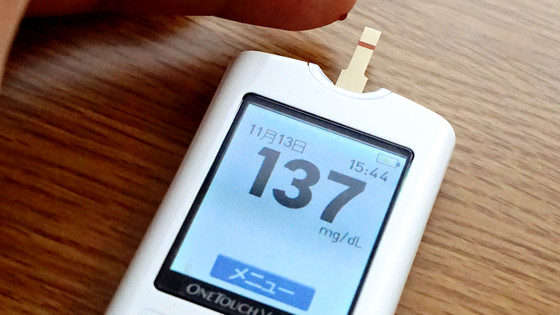In order to correctly manage the blood glucose level it turned out that personal intestinal bacteria and genetic information are necessary

by National Human Genome Research Institute
It is said that more than 1000 types of bacteria are inhabited in the human intestine, and its kind and quantity varies from person to person. The composition of this intestinal bacterium is called bacterial flora (so) or microbiome . Until now, the movement of the blood glucose level was predicted using the amount of carbohydrates and calories contained in the meal, but "In order to predict the blood glucose level after meals with higher accuracy, consider individual differences due to microbiomes and heredity Experimental results showing that it should be "reported.
Assessment of a Personalized Approach to Predicting Postprandial Glycemic Responses to Food Among Individuals Without Diabetes. | Lifestyle Behaviors | JAMA Network Open | JAMA Network
https://jamanetwork.com/journals/jamanetworkopen/fullarticle/2723644
Counting calories or carbs is not the best way to manage blood sugar - Quartz
https://qz.com/1547712/counting-calories-or-carbs-isnt-the-best-way-to-manage-blood-sugar/
Blood glucose level is the amount of glucose in the blood. If you eat a meal, the blood sugar level will rise, blood glucose will go down if you do not eat anything or exercise. If blood glucose level continues high on a daily basis, diabetes may cause various complications, and in order to seek long-term health, blood glucose levels must be kept firmly from day to day. For that purpose, it is said to be important to reduce the amount of carbohydrates and intake calories in the meal.

Mayo Clinic doctors in Minnesota conducted experiments on 327 people who did not suffer from diabetes in order to develop a model that accurately predicts blood sugar levels after meals. Subjects submitted samples of the stool, recorded the diet indispensable further in the diary, lived for 6 days while equipped with a blood glucose monitor to take sufficient rest and pay attention to the exercise and measure the blood glucose level That's right.
As a result of considering various personal factors including not only the meal contents but also the microbiome of each subject and the timing of meals, the research team was able to predict blood glucose change with an accuracy of 62%. On the contrary, we could predict only 32 to 40% accuracy in the conventional method which considers only the amount of carbohydrates and calories contained in meals.

Helena Mendes Soares, chief author of the study said, "The general approach to calculating only the amount of carbohydrates and calories does not make predictions of blood glucose so well, if it is a model that takes personal microbiome into account Experiments have shown that it is possible to accurately predict the response of the blood glucose level after meals. "
In addition, Mr. Purna Kashyap, one of the research teams, says, "In our individual model there is no need to give up on specific categories of food, so we only need to eat a meal suitable for my microbiome." .
Considering microbiomes and heredity, the content of nutrition and the way of dieting will vary from individual to individual. Food companies are already paying attention to this way of thinking, and services that "analyze DNA and introduce diet and supplement suitable for individual" have already been deployed in Nestlé Japan.
Related Posts:
in Science, Posted by log1i_yk







